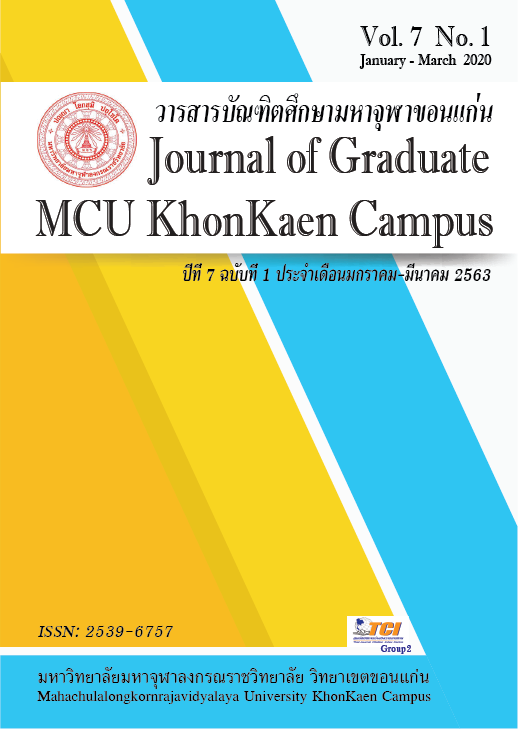THE ANALYTICAL STUDY OF HUANG PO’S CONCEPT OF THE EMPTY MIND
Main Article Content
Abstract
The aims of this research were: 1) to study the concepts of the empty mind in Buddhist philosophy; 2) to study the mind concept of Huang Po; 3) to analyze the concepts of mind in the Buddhist philosophical perspectives and the empty mind of Huang Po. This study was carried out by mean of the documentary research and the data were collected from the primary and secondary sources before being presented by the descriptive analysis based on the inductive reasoning method.
The research results were as follows:
1) According to the concept of the mind in Buddhist philosophy, the mind (citta) is the condition to perceive the feeling through the sense doors (ajjihattikāyatana). It is the element (dhātu) with the qualification of cognition which is intangible. Based on the natural characteristics of the mind in Buddhist philosophy, citta, mano and viññāṇa are the same in term of their status. The mind in Mahayana Buddhism has its characteristic as the original mind which generally remains. The process of the mind's perception in Buddhist philosophy is called ‘ālayaviññāṇa’ that is the ultimate goal of the mind development in Buddhist philosophy. The enlightenment in the view of Zen focuses on the sudden enlightenment called ‘satori’ meaning the realization of the highest truth. It is the perception experience that all things in the universe are united. There are three principles to attain the dhamma: ‘sasen’ or meditation, ‘sunsen’ or dhamma puzzle consideration and ‘mondo’.
2) The study of the mind concept of Huang Po found that the mind is characterized as the Buddhahood or primordial mind that is emptiness with its true nature covered by thought or defilements. There is only one mind. Without this, there is nothing. The primordial mind is emptiness. The principal practice to attain the highest Buddha nature and the concept of liberation of the mind in the teaching of Huang Po that ‘the mind is not the mind contaminated, it is separated without involvement with the tangible’ is to make the mind calm, pure, empty and focused on the highest goal.
3) Based on the analysis of the concepts of mind in the Buddhist philosophical perspectives and the empty mind of Huang Po, it was found that the empty mind or emptiness is the dharmakāya, sambhogakāya and nirmaṇakāya leading to nirvana, and is the empty condition of the mind from suffering in both worldly and dhamma realms. The mind is emptied of thought, motive, self and wisdom. The characteristic of emptiness is the formation of cetasika (mental concomitants) that is the internal emptiness which is the original nature. The emptiness or suññata is for the sake of the happiness of beings. Making the mind's emptiness has many benefits: 1) to reduce wandering thought; 2) to reduce stress; 3) to reduce anger; 4) to calm the mind and create physical and mental happiness; 5) to purify the mind; 6) to empower the mind; 7) to be conscious; 8) to cultivate wisdom; 9) to lead the mind to goodness and nirvana.

